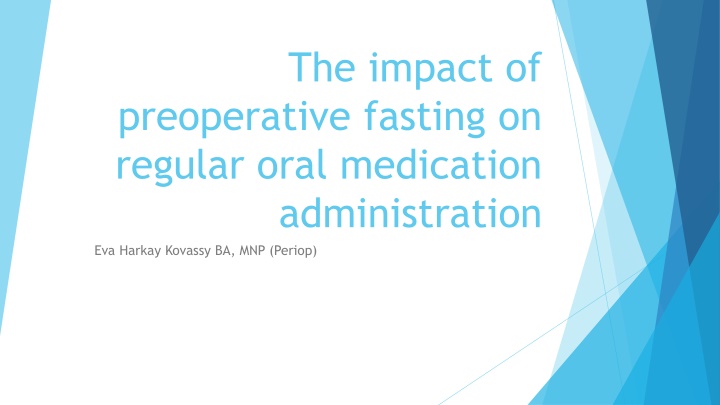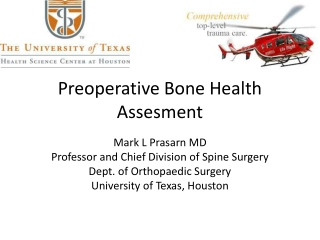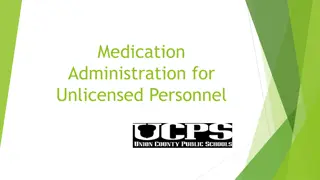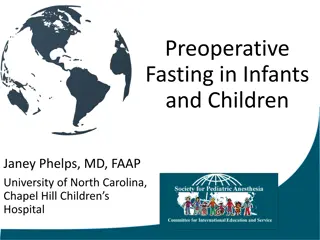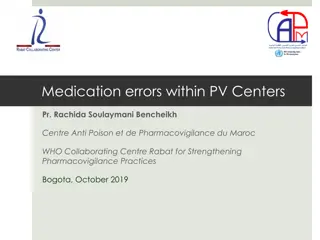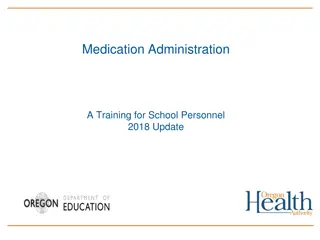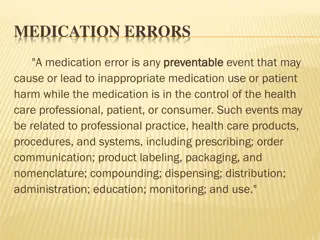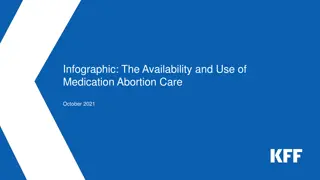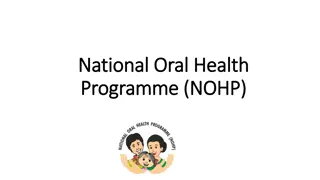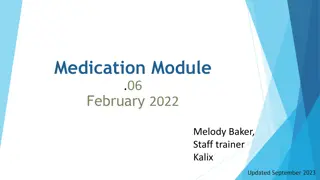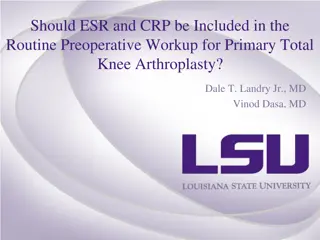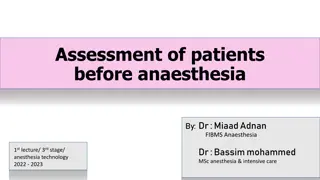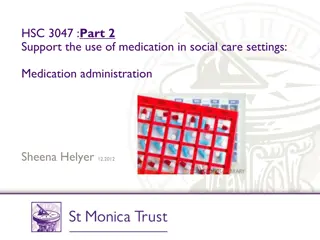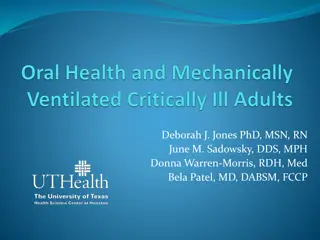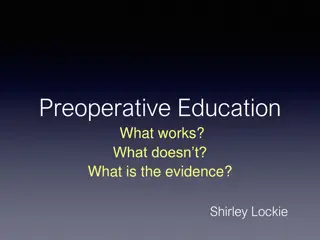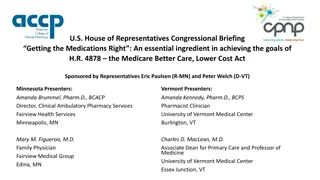Impact of Preoperative Fasting on Oral Medication Administration
Investigating the impact of preoperative fasting on the continuity of regular oral medication administration reveals concerns with excessive fasting, including insulin resistance, dehydration, and confusion. The study highlights how misleading fasting instructions can lead to the discontinuation of essential medications, emphasizing the importance of maintaining regular medication administration for preoperative patients.
Download Presentation

Please find below an Image/Link to download the presentation.
The content on the website is provided AS IS for your information and personal use only. It may not be sold, licensed, or shared on other websites without obtaining consent from the author.If you encounter any issues during the download, it is possible that the publisher has removed the file from their server.
You are allowed to download the files provided on this website for personal or commercial use, subject to the condition that they are used lawfully. All files are the property of their respective owners.
The content on the website is provided AS IS for your information and personal use only. It may not be sold, licensed, or shared on other websites without obtaining consent from the author.
E N D
Presentation Transcript
The impact of preoperative fasting on regular oral medication administration Eva Harkay Kovassy BA, MNP (Periop)
Aims & Objectives The aims of this study were to investigate pre-operative fasting practices and examine the impact of pre-operative fasting practices on the continuity of administration of patients regular oral medications.
Background Patients awaiting surgery, whose fasting is initiated and managed in hospital, are often over-fasted. Many of these patients who are on long-term medication therapy for the management of chronic disease arrive to the operating theatre without having one or more of their regular oral medications.
Design A prospective, descriptive, exploratory approach was used. Method Data were collected from patients medication charts, perioperative documents, and progress notes from October 6 to November 3, 2016.
Fasting Guidelines Solids/Liquids Fasting Times Normal meal 8 hours Light meal 6 hours Clear fluids, approved CHO drink 2 hours
Fasting Guidelines Eastern Health. (2015).
Concerns with excessive fasting insulin resistance (Diks et al., 2005), dehydration, hypovolaemia, confusion (Hung, 1992), and increased levels of anxiety (Tosun, Yava, & A kel, 2015).
Impact of preoperative fasting on oral medication management The nil by mouth fasting instruction for preoperative patients is misleading and leads to subjective interpretation (Chand & Dabbas, 2007), Preoperative fasting creates confusion for both nurses and junior doctors often resulting in the discontinuation of regular medications (Chand & Dabbas, 2007; Kluger et al., 1991), Clinicians may not appreciate the importance of maintain regular medication administration (Pearse & Rajakulendran, 1999).
Role of the nurse in medication management during preoperative fasting Nurses are responsible for administering prescribed medications but the perioperative period complicates this task due to: fasting, the complexity of the issue of using medications (Pass & Simpson, 2004), and the lack of consensus among doctors (Pearse & Rajakulendran, 1999; Symons & McMurray, 2014).
Importance of medication management of chronic disease Almost 50% of all Australians suffer from a chronic disease with one in five suffering from multiple chronic diseases (Australian Institute of Health and Welfare, 2016a), Chronic diseases manifest long-lasting symptoms and as a result, impact on the quality of life, Medications that control these symptoms are the cornerstone of chronic disease management, Chronic disease falls into one of eight categories: arthritis (osteoporosis and other musculoskeletal conditions), cancer, respiratory (asthma and chronic obstructive pulmonary disease [COPD]), cardiovascular disease, diabetes, mental health conditions, chronic kidney disease, and oral diseases (tooth decay and gum disease) (Australian Institute of Health and Welfare, 2016b).
Importance of medication management of chronic disease The foundation medications to combat cardiovascular events are aspirin and clopidogrel (Le Manach et al., 2014), Chronis obstructive pulmonary disease is treated by inhaling bronchodilators and corticosteroids (COPD-X Guidelines Committee, 2015), Insulin and oral antihyperglycaemics are medications used in managing diabetes (Diabetes Australia, 2015), Antihypertensives are the cornerstone in managing chronic renal disease (National Kidney Foundation, 2004). Parkinson s disease is a degenerative disease and has no cure; the main form of treatment is medication (Australian Institute of Health and Welfare, 2012).
Non-therapeutic medication omission In an audit of cardiac medication administration, 42.2% of patients did not receive either one or more of their medications (Corfield et al., 2006). A separate study revealed that 49%, almost half, of all medications were not given on the day of surgery (Kluger et al., 1991). A third study gave evidence that showed only 41% of all patients suffering from cardiovascular disease received their medications in the preoperative period (Duthie et al., 1987). Similar results were found in a fourth study where 43% of patients did not have their medications administered to them prior to surgery (Pearse & Rajakulendran, 1999).
Consequences of non-therapeutic medication omission Non-therapeutic omission of cardiac medications, antihypertensives, and statins have resulted in cardiac complications such as: severe postoperative hypertension, congestive heart failure, pulmonary oedema, and life-threatening dysrhythmias (Kennedy et al., 2000), other known complications are angina, myocardial infarction, rebound hypertension, ventricular arrhythmias, and sudden death (Kennedy et al., 2000; Reidenberg, 2011).
Consequences of non-therapeutic medication omission Missed doses of antiparkinsonian medications may cause: medical complications, ensue prolonged hospital length of stay, and delayed recovery (Katus & Shtilbans, 2014), a worsening of their Parkinson s disease including increased rigidity, agitation, difficulty swallowing, and hallucinations (Fagerlund et al., 2013), confusion and nausea; treating these conditions with antidopaminergic medications such as haloperidol and metoclopramide will only contribute to further decline (Derry, Shah, Caie, & Counsell, 2010).
Consequences of non-therapeutic medication omission There is clear evidence that shows that omissions of anticoagulants and antiplatelets in the preoperative period for patients with coronary stents have potentially life-threatening outcomes (Kristensen et al., 2014; The Cardiac Society of Australia and New Zealand (CSANZ), 2009; Weed et al., 2014). In patients who have had either metal or medication-eluding coronary stent procedures within 12 months prior to a subsequent surgery, coronary stent thrombosis is of major concern. To prevent the blot clots from forming, patients are often prescribed dual-platelet therapy consisting of aspirin and clopidogrel (Heart Foundation, 2013). There is evidence that shows approximately 40% of coronary stent thromboses have occurred in patients who were receiving either dual antiplatelet therapy or clopidogrel alone but had them ceased perioperatively (CSANZ, 2009). Ceasing oral antiplatelet medications has been identified as a sole predictor for critical ischaemic episodes and death (Collet, 2004).
Reasons for non-therapeutic medication omission in preoperative period In a recent study (Symons & McMurray, 2014) investigating factors influencing nurses decisions to withhold oral medications pointed to three areas of focus: Ward culture, perception of their scope of practice, and various patient factors Ward culture embraced inconsistent practices, staffing, and communication and interpersonal relationships, Due to a lack of clear guidelines, lack of clear communication between the nurses and doctors, inconsistent instructions by medical staff, lack of education of nursing staff, and possibly personality clashes among the nurses.
Results There were 55 patients included in the study, Patients were often over-fasted with a mean fasting time of 11.0 hours for solids and 10.8 hours for liquids,
Administration of oral medications Frequency (N=184) 84 73 27 Percentage of total 45.7 39.7 14.7 Given Not given Unknown
Conclusion Patients were fasted in excess of fasting guidelines. More than half of the oral medications prescribed to be administered during the preoperative fasting period potentially resulted in non-therapeutic medication omissions.
Strengths and limitations The study was conducted at two hospitals of a single health service. It is not clear whether the findings are representative of other hospitals. The study was reliant on medical record data so there may have been care delivered but not documented (Bothamley & Mardell, 2005). There was missing data in relation to medications making it difficult to understand what actually happened. As many patients are admitted on the day of surgery, the sample size for the study was limited by patients having to have commenced their fasting in hospital under the direction of the clinical teams.
Strengths and limitations This is the first study in Australia to examine two nursing practices that are inextricably linked: preoperative fasting and oral medication administration. Although opinions, attitudes, and knowledge of clinicians were not examined in this study, the recorded evidence of practice by nurses and doctors gives information to guide future research. This study was conducted at a major Victorian health service and in two different hospitals. There was a spread of data across different sites. The prospective approach and rigorous inclusion criteria also adds to its strength.
Implications for further research Future research needs to examine the barriers in accessing best practice guidelines, the barriers nurses experience in understanding them, and the barriers to guideline implementation. Further research is required to look at missed medications and patient outcomes. Barriers nurses experience in the management of preoperative patients oral medication administration, their communication via the use of documents and documentation, and the patient preoperative fasting experience also needs to be studied.
Implications for policy and practice Preoperative fasting guidelines need to be clearly understood by surgical nurses in order to best advocate for their patients. Access to hospital guidelines need to be made easy and available in a variety of formats to all clinical staff. The active participation of all clinicians is essential in supporting their patient during the preoperative pathway. Members from the surgical and/or anaesthetic team need to communicate fasting requirements more accurately for each patient differentiating times between solids and liquids (Jester & Williams, 1999).
Implications for policy and practice Informing the nurse of the last possible time the patient can have food or drink as a prescription will assist in ensuring patients are properly nourished and not dehydrated (Jester & Williams, 1999). A practice of prescribing the accepted and promoted carbohydrate- rich drink to suitable patients on the patients medication charts should also be implemented. The use of electronic medication records (EMR) should be used to prompt the last meal and drink for each patient. Timers to be used on the wards as Hunger Clocks should be made readily available to monitor elapsed time between cancelled and rescheduled surgeries.
References Australian and New Zealand College of Anaesthetists [ANZCA]. (n.d.). Frequently asked questions. http://www.anzca.edu.au/patients/frequently-asked-questions Australian Institute of Health and Welfare. (2016). 1 in 5 Australians affected by chronic diseases. Retrieved 19 June, 2016, from http://www.aihw.gov.au/media-release-detail/?id=60129552034 Australian Institute of Health and Welfare. (2016). About chronic disease. Retrieved 19 June, 2016, from http://www.aihw.gov.au/chronic-diseases/about/ Bothamley, J., & Mardell, A. (2005). Preoperative fasting revisited. British Journal Of Perioperative Nursing: The Journal Of The National Association Of Theatre Nurses, 15(9), 370-374. Retrieved from http://ezproxy.deakin.edu.au/login?url=http://search.ebscohost.com/login.aspx?direct=true&db=c medm&AN=16178206&site=ehost-live&scope=site Chand, M., & Dabbas, N. (2007). Nil by mouth: a misleading statement. Journal Of Perioperative Practice, 17(8), 366. Retrieved from http://ezproxy.deakin.edu.au/login?url=http://search.ebscohost.com/login.aspx?direct=true&db=cc m&AN=2009669200&site=ehost-live&scope=site COPD-X Guidelines Committee. (2015). The COPDX Plan: Australian and New Zealand Guidelines for the management of Chronic Obstructive Pulmonary Disease 2015 Retrieved July 13, 2016, from http://copdx.org.au/wp-content/uploads/2015/06/COPDX_V2_41_May15.pdf Corfield, L. F., Trivedi, P. M., & Wilson, D. (2006). Preoperative cardiac drug administration in general surgical patients: A completed audit. International Journal Of Clinical Practice, 60(10), 1300-1302. Retrieved from http://ezproxy.deakin.edu.au/login?url=http://search.ebscohost.com/login.aspx?direct=true&db=m dc&AN=16942590&site=ehost-live&scope=site
References Derry, C. P., Shah, K. J., Caie, L., & Counsell, C. E. (2010). Medication management in people with Parkinson's disease during surgical admissions. Postgraduate Medical Journal, 86(1016), 334-337. Diabetes Australia. (2015). Managing your diabetes. Retrieved 24 June, 2016, from https://www.diabetesaustralia.com.au/managing-your-diabetes Diks, J., van Hoorn, D. E. C., Nijveldt, R. J., Boelens, P. G., Hofman, Z., Bouritius, H., . . . van Leeuwen, P. A. M. (2005). Preoperative fasting: an outdated concept? JPEN. Journal Of Parenteral And Enteral Nutrition, 29(4), 298-304. Duthie, D. J., Montgomery, J. N., Spence, A. A., & Nimmo, W. S. (1987). Concurrent drug therapy in patients undergoing surgery. Anaesthesia, 42(3), 305-306. Eastern Health. (2015, 2015). Fasting for Anaesthesia and Sedation elective surgery and emergency procedures Policy Number 162. Fagerlund, K., Gurvich, O., & Anderson, L. C. (2013). Perioperative Medication Withholding in Patients with Parkinson's Disease: A Retrospective Electronic Health Records Review. American Journal of Nursing, 113(1), 26-35. Retrieved from http://ezproxy.deakin.edu.au/login?url=http://search.ebscohost.com/login.aspx?direct=true &db=ccm&AN=2011885659&site=ehost-live&scope=site doi: 10.1097/01.NAJ.0000425749.73429.51 Hung, P. (1992). Preoperative fasting of patients undergoing elective surgery. British Journal Of Nursing (Mark Allen Publishing), 1(6), 286-287.
References Jester, R., & Williams, S. (1999). Pre-operative fasting: putting research into practice. Nursing Standard, 13(39), 33-35. Katus, L., & Shtilbans, A. (2014). Perioperative management of patients with Parkinson's disease. American Journal of Medicine, 127(4), 275-280 276p. doi: 10.1016/j.amjmed.2013.11.014 Kennedy, J. M., van Rij, A. M., Spears, G. F., Pettigrew, R. A., & Tucker, I. G. (2000). Polypharmacy in a general surgical unit and consequences of drug withdrawal. British Journal Of Clinical Pharmacology, 49(4), 353-362. Kluger, M. T., Gale, S., Plummer, J. L., & Owen, H. (1991). Peri-operative drug prescribing pattern and manufacturers' guidelines. An audit. Anaesthesia, 46(6), 456-459. Le Manach, Y., Kahn, D., Bachelot-Loza, C., Le Sache, F., Smadja, D. M., Remones, V., . . . Gaussem, P. (2014). Impact of Aspirin and Clopidogrel Interruption on Platelet Function in Patients Undergoing Major Vascular Surgery. PLoS ONE, 9(8), 1-9. doi: 10.1371/journal.pone.0104491 Mendelson, C. L. (1946). The Aspiration of Stomach Contents into the Lungs During Obstetric Anesthesia Anesthesiology (Abstracts Only), 7(6), 694-696. Nagelhout, J., Elisha, S., & Waters, E. (2009). Should I Continue or Discontinue That Medication? AANA Journal, 77(1), 59-73.
References National Kidney Foundation. (2004). K/DOQI Clinical Practice Guidelines on Hypertension and Antihypertensive Agents in Chronic Kidney Disease. Retrieved 24 June, 2016, from http://www2.kidney.org/professionals/KDOQI/guidelines_bp/guide_1.htm Pass, S. E., & Simpson, R. W. (2004). Discontinuation and reinstitution of medications during the perioperative period. American Journal of Health-System Pharmacy, 61(9), 913-914. Pearse, R., & Rajakulendran, Y. (1999). Pre-operative fasting and administration of regular medications in adult patients presenting for elective surgery. Has the new evidence changed practice? European Journal Of Anaesthesiology, 16(8), 565-568. Reidenberg, M. (2011). Drug discontinuation effects as part of the pharmacology of the drug. Journal of Pharmacology and Experimental Therapeutics, 339(2), 324-328. doi: 10.1124/jpet.111.183285 Symons, V. C., & McMurray, A. (2014). Factors influencing nurses to withhold surgical patients oral medications pre- and postoperatively. Collegian, 21(4), 267-274 268p. doi: 10.1016/j.colegn.2013.05.004 Tosun, B., Yava, A., & A kel, C. (2015). Evaluating the effects of preoperative fasting and fluid limitation. International Journal of Nursing Practice, 21(2), 156-165 110p. doi: 10.1111/ijn.12239
